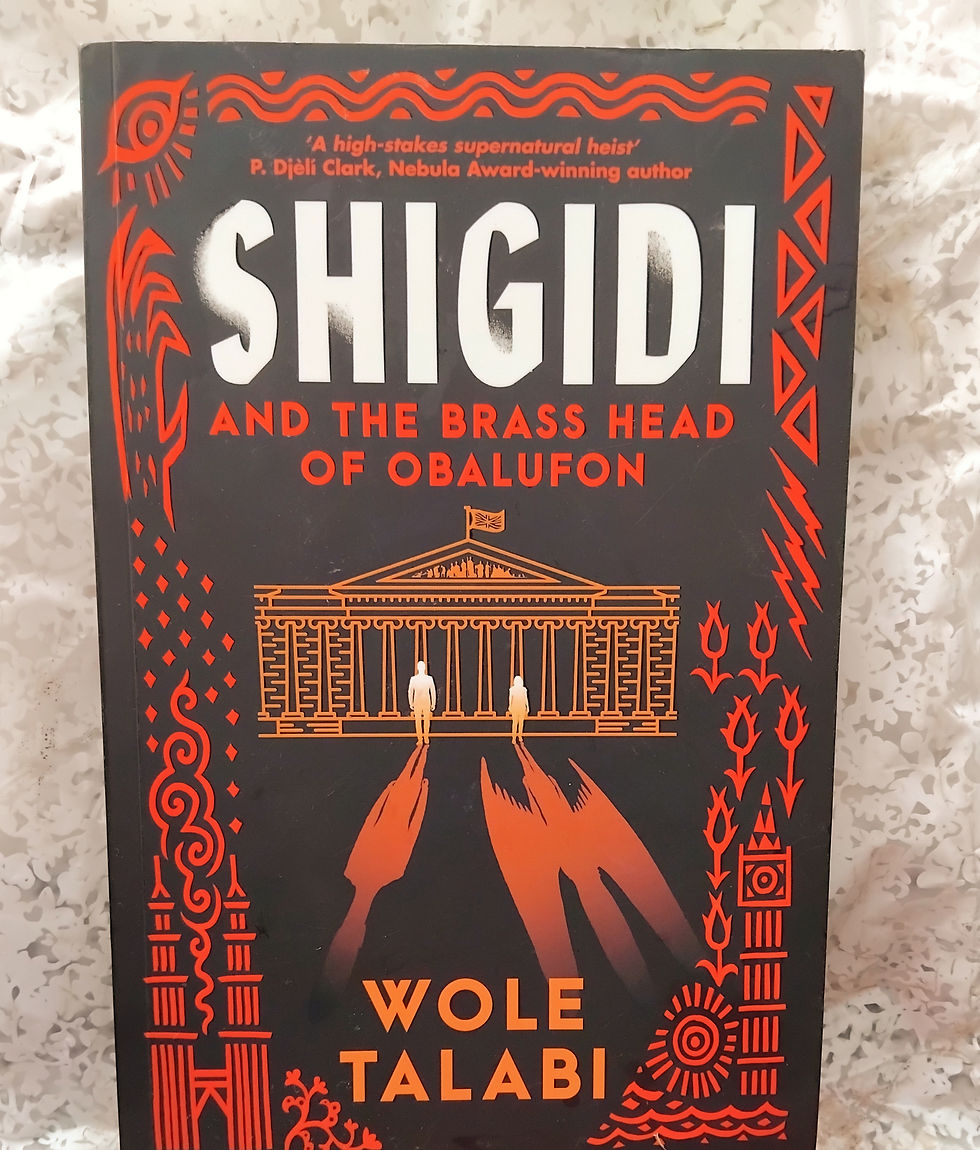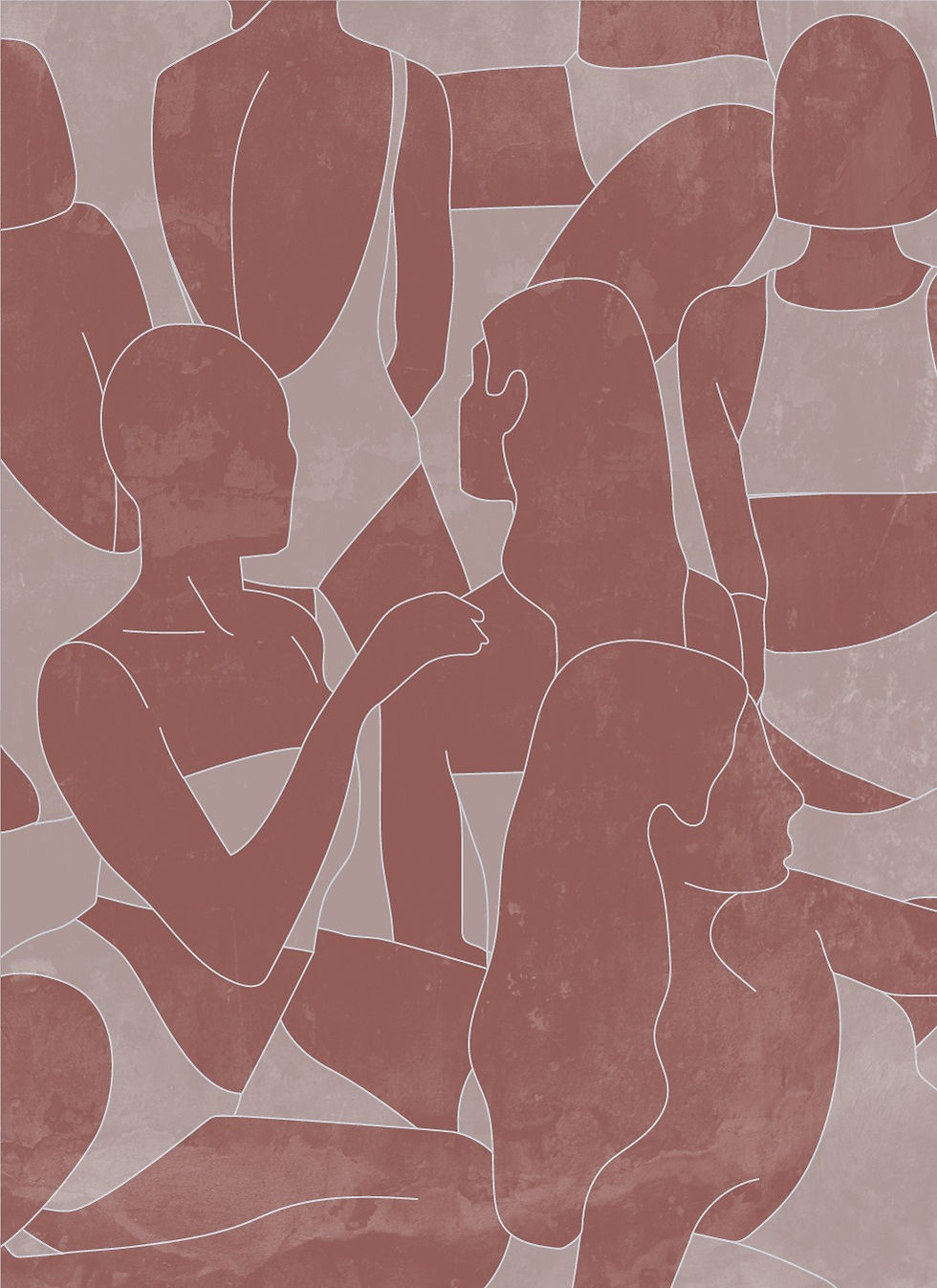"Exploring African Myth: A Review of the Novel 'Shigidi'
- BUSAYO

- May 30, 2024
- 6 min read

I decided to read this book after reading a review of it back in December.
So, it only makes sense that I write my own review.
Right?
You can never have too many reviews of one book. There is always a new perspective that each reader can bring, a new layer that a fresh pair of eyes can tease out.
I really enjoyed reading this book. I’m not sure I’ve read a lot of full-length works of speculative fiction. Or a story embedded in mythology, that was specifically of African origin. So, I was really curious about what this book would bring to the table.
While I was reading it, I remember offering my brother a chance to read it, just chipped it in as subtly as… “Oh, would you like to read this when I am done, I’ve been enjoying it so far”
He said no.
And, I had to ask… why?
Well, he said the reason was because he didn’t seem to expect much from a Nigerian book, or one that is specifically written in that genre. I found it to be surprising. A little.
But really, it is a sentiment that I can understand. He shared that same opinion about Nigeria’s movie industry just some years ago. And if we are being honest. So did I.
Yet, what a change has come to the movie industry in Nigeria. It isn’t perfect yet, but anyone who isn’t taking Nigerian movies seriously is… unserious. There are some really great stories being told now, the industry has a much bigger international market than before. And well, it is just nice to own something that is yours. Also, bit of a side note but this Nollywood series, Anikulapo is a pretty great exploration of something that could be considered speculative fiction.
I mean, if you don’t think the dark forces are real, at least.
Now, back to topic. I think it is unfair to believe that every Nigerian speculative book will be a miss because it is Nigerian, or because it is a relatively small section of a literary industry that is still quite young.
I was more than ready to give this book a chance. I mean, I bought it during the Naira exchange rate debacle (Fun news: the book is like 25% more expensive now).
Still, I was dedicated. I wanted to know what this book had to say.
SO… WHAT DID THIS BOOK HAVE TO SAY?
At the heart of it, this book is a heist story.
At the heart of that heist story, is a love story between two (knuckleheaded) characters. I cannot say that I was rooting for their love to take flight. I also cannot say that I wasn’t, I am not a hater.
But really, this book managed to hold my attention despite my growing irritation about two characters unwilling to just admit that they had feelings for each other.
But really, haven’t we all been there? (As teenagers, ha-ha)
What I did love though, was seeing a lot of the characters that I am a bit familiar with re-imagined in the modern day.
A reviewer said this book is reminiscent of American Gods by Niel Gaiman. In that the gods of the old from as far and wide as Olympus to Persia, were imagined in the modern day as forgotten relics trying desperately to keep themselves alive, relevant, by finding some worshippers here and there. And in some cases, even working themselves into the times with ‘restructuring’.
For example, in American Gods, I think it was Aries or some other war god that had changed his headquarters to a small white town in America where their love for guns (and thereby, gun violence) is a substitute for the war mongering of the ancient world. I wonder, if he really wanted to set up headquarters in America’s love for war, why not go to the middle east where America loves to fund unnecessary wars? Or Vietnam, since it was in the seventies ( I think?) that scene was depicting anyways. Or Libya, or Cambodia.
You get the idea.
So, just like in Niel Gaiman’s work, we get to see the ancient gods of Yoruba mythology, the Orisha pantheon, dealing with the post-colonial, post-monotheistic fall out of not having worshippers anymore. It is true.
The majority of present-day Yoruba people are either Christian or Muslim, but a small portion of them stick to the traditional religion. In fact, as I write this, there is a traditional festival going on where women and men who are not indigenes of the town I am in are not allowed to be seen outside their homes.
People that worship gods in the Yoruba pantheon still exist, but as the Orisha Spirit Company knows, they are far too few. And their devotion and offerings are therefore not enough either.
It is why Olorun, the head of the Yoruba pantheon, and the company CEO, decided that a heist was needed. The company, the religion, the gods needed more power, and the best way to do that was by getting an old mask that was taken away during colonial raids.
If you didn’t know, a lot of Africa’s, and Asia’s, and even… Greek art is stored away in museums around Europe. There is a whole (condescending) conversation about how Europe has no reason to return its looted treasures because Africans can’t take good care of it anyways.
The Nigerian in me is like, even if we want to bury it in a random backyard, what is your business? Aren’t we the rightful owners and therefore the ones who get to decide what happens to our own property?
Anyways, they get on that heist, and… this is where I stop telling you about the plot so I don’t give any spoilers.
A BOOK ABOUT WHO GETS TO IMAGINE.
It is interesting to me the angle that this author writes the book in.
Just as modern day Africa is subject to rules and regulations by Western countries, the gods in this book also have to deal with unfair immigration policies.
The reason Olorun cannot carry out the heist himself is because he pretty much doesn’t have the right visa to take him to the part of London’s spirit side that would give him access to it in the first place.
This story is really steeped in the politics of being African in Africa, and in international waters… or spirit side.
Like I said about this book in the beginning, you don’t see a lot of something like this.
I mean, in literary fiction, African immigrants are the stars of the show. The immigrant’s story is very familiar. But the immigrating god’s story. Now, that is new. Ha-ha.
I love the fact that this story takes us through multiple continents. Europe, Africa, we even see some of Asia’s ancient beliefs showing up. But it isn’t done in a gimmicky way like; oh, look at all of these scenes and places I can show you in this book.
It is written to show the complex relationship that these continents have with one another.
And it does this while remaining at its heart a character driven story. Heist story. Love story, etc.
For me, one thing that I love is how this book in a way skirts around the very big question of who gets to imagine Africa’s past. Its former beliefs, and also its future.
And even more, how these are imagined.
The world in Nigeria seems to be moving everyday away from taking anything related to the African pantheon seriously. It is a fair thing, people have the right to choose what they believe. There are some arguments about how these beliefs are tied to practical wisdom handed down from generations. And that some parts of culture will inevitably be lost.
For me, anything that involves human sacrifices and sending spirits to kill your enemies, that should be done away with. Okay?
It is not entirely a loss.
I think an ethnicity’s identity is much more nuanced than just what their ancestors believed.
In conclusion, this book was a treat. There is so much more that I could talk about as regards this book, but this post would become too long. And, wouldn't it be great to leave something for another reviewer to tease out?
As a side note, I have no intentions to give this book out to anyone. Don’t ask me for it. It's not going to happen. This book is expensive ha-ha.
Well, for a book.
I think you should give this book a read, even if you’re not so optimistic about what Nigerian speculative fiction can do. This is a good place to start to change your mind.
And if you do, let me know what you think.



Comments